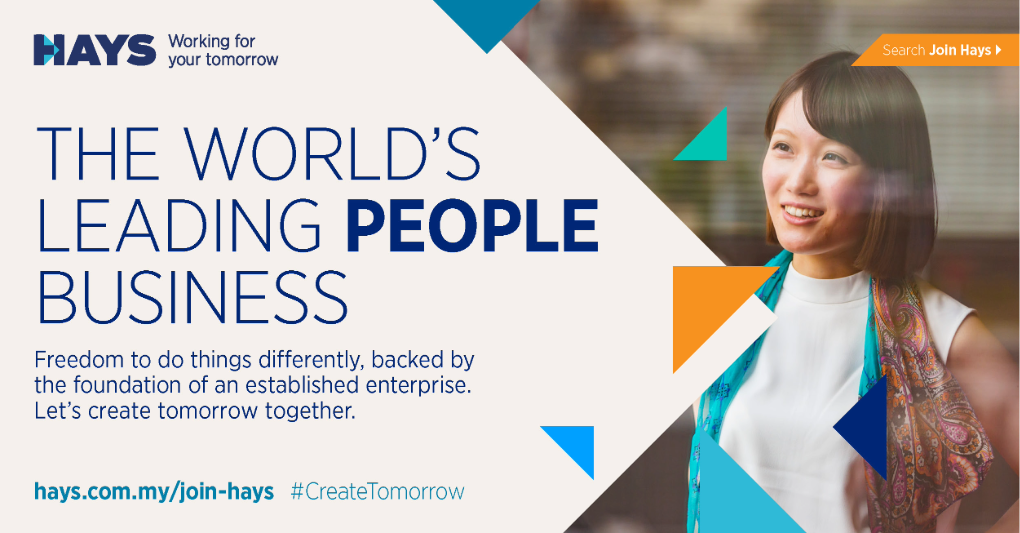HR professionals in Asia need to plug in to get to the top

Networking is the number one career development tool used by the majority of HR Directors (HRDs) in Asia, according to research by recruiting experts Hays.
The research, based on an extensive survey of 500+ HRDs across Asia plus in-depth face-to-face interviews with five top HRDs, has been released in the DNA of an HRD report to provide career savvy HR professionals with insights into what it takes to get to the top of their profession.
Plugging into their professional network to keep up with emerging trends was nominated as the top career development tool by 56 per cent of respondents. Of those, 73 per cent prefer networking events while 57 per cent use technical events to keep up with changing trends.
Social media was used to network with HR peers by 41 per cent of respondents with 88 per cent nominating LinkedIn as their social channel of choice. A further 47 per cent use Facebook and 40 per cent WeChat. Of the respondents from Mainland China, 91 per cent are on WeChat.
Most of the HRDs taking part in the Hays research were either from Mainland China, Japan, Hong Kong, Malaysia or Singapore.
Continuing education was also nominated as an important way to keep across what is going on. A total of 97 per cent of respondents hold a bachelor’s degree, but 33 per cent have also pursued an MBA and 36 per cent additional HR qualifications such as those available through the Chartered Institute of Personnel and Development the Human Resources Certification Institute or SIX Sigma.
“Plugging into every aspect of the business where they hold a senior role was also considered crucial to being a successful HRD,” says Tom Osborne, Regional Director of Hays Malaysia.
“HR is an increasingly dynamic career choice and to truly partner with the business, HR leaders need to keep up with the constant changes taking place across most industries and professions in Asia, but also the world,” says Tom.
“It’s not surprising that being ‘commercially aware’ was the number one piece of advice for up and comers offered by more than half our respondents.
“Tapping into the learning opportunities offered by gaining international experience was also recommended by HRDs, although only 29 per cent of our survey group had worked outside Asia during their career.”
“Nearly half (45 per cent) of our respondents consider working outside your home country a must for career development and 47 per cent are currently considering working overseas. Of those who had worked overseas, 97 per cent found the experience beneficial to their career.”
“The DNA of an HRD is really a must read for any aspiring HR leader. We are very grateful that so many HR leaders shared their thoughts on what it takes to rise up to the top job in their profession,” says Tom.
Top six skills every HRD must have
- Strategic planning (nominated by 53 per cent of respondents)
- Stakeholder engagement/influencing (43 per cent)
- People management (41 per cent)
- Commercial acumen (39 per cent)
- Communication (30 per cent)
- Change management (26 per cent)
Top personal characteristics needed by HRDs
- Proactive nature (59 per cent)
- Adaptive (47 per cent)
- Goal focused (41 per cent)
- Ethical (41 per cent)
- Collaborative (39 per cent)
- Influential (39 per cent)
- Credible (39 per cent)
- Resilient (37 per cent)
- Confident (36 per cent)
- Hard working (32 per cent)
- Empathic (32 per cent)
- Analytical (32 per cent)
Other findings from the DNA of an HRD include:
- The majority of respondents (36 per cent) reached HRD level after working 11 to 15 years in HR;
- 86 per cent had more than 10 years’ post-qualification experience in HR when appointed HRD of which, 24 per cent had more than 20 years experience in HR;
- 30 per cent of respondents had more than 16 years experience in HR before reaching HRD and 12 per cent secured the role with less than six years experience in HR;
- Depending on the size of the organisation, most (40 per cent) respondents reached HRD in two to three promotions, 35 per cent in four to five and 12 per cent six or more promotions;
- Women comprised 59 per cent of respondents with 71 per cent aged between 36 and 50 at the time of the survey and 26 per cent aged 41 to 45;
- Only 12 per cent of respondents had only worked for the one organisation while 52 per cent had worked outside HR all together at some point in their career.
- Of the 29 per cent of HRDs who have worked outside Asia, 43 per cent worked in North America, 31 per cent in Europe; 22 per cent the UK and 21 per cent in Australia and New Zealand;
- Of the 97 per cent of respondents who hold a bachelor’s degree, 31 per cent hold a business, commerce, finance or economics degree and only 16 per cent a bachelor’s degree in HR;
- 42 percent believe employee engagement will be the biggest challenge of the coming year followed by aligning strategic requirements with operational budget and workforce (41 per cent);
- Other challenges in the coming year include company culture (38 per cent) retaining employees (38 per cent) dealing with the economic environment (37 per cent) and attracting and recruiting new talent (36 per cent);
- 44 per cent see organisational politics as a key challenge and 55 per cent believe designing and managing organisational change will play a bigger part in their work in the near future;
- Looking ahead to the next five years, 58 per cent expect identifying and retaining key talent and succession planning to be the biggest part of their role.
The DNA of an HRD is the third in the Hays DNA series in Asia and follows the DNA of CFO and DNA of a CIO. For the full report please visit here.
Hays Research
DNA Series
Uncovering the DNA of the Future Workplace

